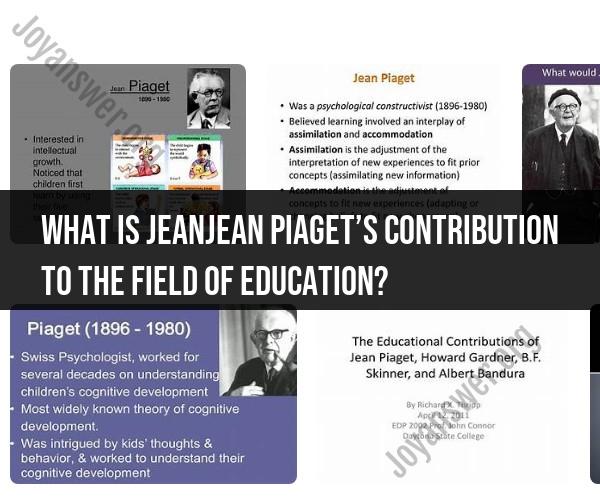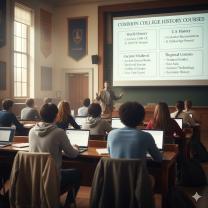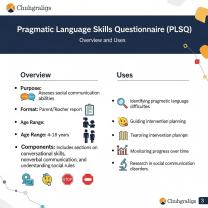What is Jeanjean Piaget’s contribution to the field of Education?
Jean Piaget was a Swiss psychologist who made significant contributions to the field of education, particularly in the areas of child development and cognitive psychology. His work has had a profound impact on the understanding of how children learn and the design of educational practices. Some of his key contributions to education include:
Theory of Cognitive Development: Piaget's theory of cognitive development outlined four stages of cognitive growth in children: the sensorimotor stage, the preoperational stage, the concrete operational stage, and the formal operational stage. This theory provided educators with insights into the stages of intellectual development in children, helping them design age-appropriate educational materials and strategies.
Constructivism: Piaget's constructivist theory emphasized that children actively construct their knowledge through interactions with their environment. This view transformed the way educators think about learning, moving away from a passive model of instruction to one that actively engages students in hands-on, experiential learning.
Schemas and Assimilation: Piaget introduced the concept of "schemas," which are mental structures that individuals use to organize and make sense of information. He also introduced the idea of "assimilation," where children incorporate new information into their existing schemas. Educators use these concepts to understand how students learn and adapt instructional approaches accordingly.
Accommodation: Piaget's theory of "accommodation" involves modifying existing schemas when new information or experiences don't fit with what a child already knows. In education, this concept encourages teachers to help students adapt and expand their existing knowledge structures when they encounter new concepts or challenges.
Discovery Learning: Piaget advocated for "discovery learning," which involves students actively exploring and figuring things out for themselves. This approach encourages problem-solving, critical thinking, and independence, rather than passive absorption of information.
Sociocultural Learning: While Piaget's work primarily focused on individual cognitive development, it laid the groundwork for later educational theorists, such as Lev Vygotsky, to explore the social and cultural aspects of learning. Piaget's work contributed to the understanding of how social interactions and cultural contexts influence learning.
Educational Implications: Piaget's work highlighted the importance of developmentally appropriate education. His ideas have influenced curriculum development, instructional methods, and assessment techniques that consider the cognitive abilities and developmental stages of learners.
It's important to note that while Piaget's contributions have had a lasting impact on education, his theories have also been critiqued and revised over time. Some educators and researchers have adapted his ideas to better fit contemporary educational practices. Nevertheless, his work remains a foundational influence on how educators understand and support the cognitive and intellectual development of students.
Jean Piaget's Educational Contributions: A Legacy Explored
Jean Piaget was a Swiss psychologist who is best known for his theory of cognitive development. His work has had a profound impact on education, and his insights into how children learn continue to inform teaching practices today.
One of Piaget's most important contributions to education was his emphasis on the importance of active learning. Piaget believed that children learn best by doing, and he advocated for a more hands-on approach to teaching. Piaget's work also highlighted the importance of social interaction in learning, and he emphasized the need for students to have opportunities to collaborate with each other and with their teachers.
Piaget's theory of cognitive development also has a number of specific implications for education. For example, Piaget's work suggests that children need to have a solid foundation in concrete concepts before they can move on to more abstract concepts. This means that teachers should start by teaching children about concrete objects and experiences, and then gradually introduce more abstract concepts as children develop.
Piaget's work also suggests that children learn best when they are motivated to learn. This means that teachers should create a learning environment that is stimulating and engaging, and that provides students with opportunities to explore their interests.
Piaget's Impact on Education: Revolutionary Insights
Piaget's impact on education has been revolutionary. His work has helped to shift the focus of education from rote memorization to active learning and critical thinking. Piaget's insights have also led to the development of new teaching methods and curriculum materials that are designed to promote child development.
Some of Piaget's specific contributions to education include:
- The emphasis on the importance of active learning.
- The recognition of the importance of social interaction in learning.
- The understanding that children need to have a solid foundation in concrete concepts before they can move on to more abstract concepts.
- The importance of motivation in learning.
Piaget's work has also influenced the development of a number of specific educational approaches, such as constructivism and experiential learning. Constructivism is a theory of learning that emphasizes the importance of students constructing their own knowledge through active learning experiences. Experiential learning is a teaching approach that focuses on providing students with opportunities to learn through hands-on experiences.
Piaget and Education: Shaping Learning Theories
Piaget's work has had a profound impact on learning theories. His theory of cognitive development has helped us to understand how children learn and develop, and his insights have led to the development of new teaching methods and curriculum materials.
Piaget's work has also influenced the development of a number of other learning theories, such as constructivism and experiential learning. These theories have helped to shift the focus of education from rote memorization to active learning and critical thinking.
Piaget's legacy is vast, and his work continues to inform educational practices today. His insights into how children learn have helped to make education more effective and engaging for students of all ages.













